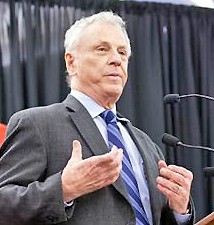Morris Dees, founder of the Southern Poverty Law Center, which in the 41 years of its existence has litigated against virtually every sort of denial of human rights, will speak Friday at the Alternative Spring Break, sponsored jointly by the Public Action Law Society and the University of Memphis Cecil C. Humphreys School of Law.
The ASB banquet featuring Dees as speaker will take place from 12 noon to 2 p.m. at the UM Law School on Front Street downtown.
The following news release provides more details:
U of M Law Students Will Forgo Spring Break to Serve the Community
For the third year in a row, the Public Action Law Society (PALS) and the University of Memphis Cecil C. Humphreys School of Law will sponsor Alternative Spring Break (ASB), an opportunity for law students from around the country to perform community service in lieu of vacationing. This year the event will be held March 5-9 at the Law School in Downtown Memphis.
Sixty-two law students from eight law schools, including 29 students from the University of Memphis, will participate in four service tracks. They will also attend a series of tutorials and presentations on “hot topics” in the law. The University of Tennessee at Knoxville and the University of Mississippi each will send eight students. Other schools participating are the University of Toledo, Valparaiso, Southern, Nova Southeastern, and George Washington University.
This year’s ASB banquet will feature Morris Dees as guest speaker. Dees co-founded the Southern Poverty Law Center (SPLC) in 1971 after a successful career in business and the law. Named one of America’s 100 most influential lawyers by the National Law Journal in 2006, Dees is known for his groundbreaking civil rights lawsuits that helped desegregate government and public institutions and for his innovative litigation that has crippled white supremacist hate groups. The SPLC promotes the ideals of equal justice and equal opportunity through the use of education, litigation, and other forms of advocacy. One of its most noted projects is its “Teaching Tolerance” campaign.
Students in the Immigration Track will partner with the Community Legal Center to represent immigrants, including undocumented immigrants, who are victims of certain serious crimes and who have cooperated with authorities in the prosecution of the perpetrator. The law students will complete U-visa applications for them. Coordinated by U of M law students, who will staff this track during the week of March 5, the project will be joined by UT law students during the week of March 12 and Ole Miss law students during the week of March 19.
Law students have volunteered in record numbers because of poignant stories such as that of T. R., the victim of aggravated statutory rape, who was just 13 years old when she was stalked, intimidated, and lured into having sex by a “friend,” who was 24. T.R.’s family had come to Tennessee from Mexico in search of work. Her mother tried to explain to immigration authorities the trauma and pain of a parent whose daughter had been sexually abused. “This not only affected her directly, but the family as a whole,” she said. “The pain, the desperation, the suffering. To know that in that moment you do not have any way of comfort. It feels like somebody stabs your heart with a knife, and nobody can stop that pain.”
The purpose of a U-Visa is twofold: it enhances law enforcement’s ability to investigate and prosecute crimes, and it furthers humanitarian interests by protecting victims of serious crimes. A U-visa will help give the T.R.’s family the comfort they need.
Students will also partner with community organizations to draft and secure sponsors for public interest legislation. Together with Operation Broken Silence, a Memphis organization dedicated to ending human trafficking at state, national, and international levels, they will draft a human trafficking bill to be introduced in the Tennessee Legislature. Another group of students, in partnership with the Public Defender’s Office and the Law School’s Mental Health Law Society, will draft a bill regarding post-civil commitment procedures for the mentally ill. A fourth group of students, in cooperation with Bank-On Memphis, will work on legislation to promote financial literacy and end predatory lending practices.
For the second year in a row, PALS will offer a Pro Se Divorce Track and an Advance Directives Track. Students will help pro se divorce litigants, couples who have no property or children, to file divorce documents and secure hearings on their petitions. They will be supervised by the Community Legal Center. Students will also travel to nursing homes, assisted living facilities, and senior centers to draft health care directives, powers of attorney, and wills for seniors. Memphis Area Legal Services and the Memphis Bar Association will oversee this track.
Atina Rizk, president of PALS, said that Alternative Spring Break is motivated by the desire of many law students to make a difference in the world. “Students come to law school with high ideals and a strong public service ethic. ASB gives them the opportunity to put their ideals into action.”
Almost all expenses of ASB are paid by PALS through fundraising. A silent auction and lunch will be held at the Law School beginning at noon on February 23 to help defray costs. The public is invited.
